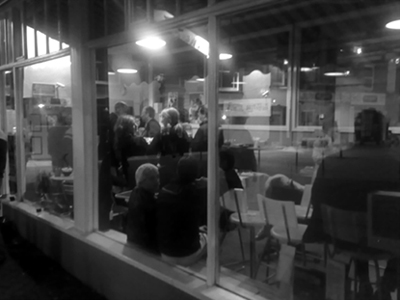We Come From Your Future: Dispatch Three 1 May 2008
Ultra-red

Migrant Organising In The Rural South West
Field Composition Three: Liberty Day Celebrations
Since the demise of the plastic film industry and ordnance manufacture in Bridgwater, Somerset the topography of migrant labour has become ever more diffuse. Thousands of migrant workers, predominantly Portuguese and increasingly more Polish, work in agriculture, food production plants, dairies and industrial laundries in the rural tracts between Taunton, Chard, Yeovil, Shepton Mallet and Bridgwater.
The presence of these migrants is subverting the rural idyll that familiar notions of the institution of the British countryside invoke through pastoral descriptions in literary works and painting.
The arrival of a Portuguese family of six into a two-bedroom terrace house on Bridgwater’s Sydenham Estate was seen by the local residents of the sprawling, post-war, suburban neighbourhood as an unwelcome phenomenon. Within months of their arrival the family had become the object of a racist campaign waged by other residents which saw acts of racial violence, criminal damage, murder attempts and death threats committed against them. On some occasions the offenders boasted their support for the National Front and the collusion and complicity amongst such a large group of people betrays an organised racism that takes place in full view of and ostensibly with the endorsement of an entire neighbourhood. Similarly the local authority and police stood by and watched, paralysed as the situation escalated and ultimately necessitated the family’s evacuation from the estate by police escort.
In subsequent meetings with the council we witnessed an immense resolve from the family who lambasted council representatives and forced an investigation into the institutional negligence that was witnessed through every stage of their case. Since their evacuation some eighteen months ago and despite assurances from the council that they have reviewed their housing policies, we have had two reports from the family that other migrant families have been located in houses not two minutes walk away from their old address. At a public event staged by regional antiracist workers from The Monitoring Group’s Rural Racism Project and Ultra-red a local antiracist activist asked the question "How do we get to hear about what is happening to people in these neighbourhoods, if we never go into them ourselves?"
These hostilities were also manifest at the family’s place of work offering no respite from the situation at home. At that time there was no existing infrastructure or support to facilitate migrant labour struggles. In light of this, all six family members initially joined the GMB, a national trade union. The GMB did nothing to act on this case, in fact accusing the family of aggression when questions were asked. At a local trade union council meeting local reps listened in genuine disbelief to the account of the family’s experience on the estate, at work and with the union, but many could not reconcile the phenomenon of racism and the rural setting. We heard rather that we were to read this as an isolated incident, that there was not organised racism in Bridgwater. The ubiquitous complacency imbued by the universal discourses on social inclusion and community cohesion had led unions to believe that this was not their issue.
Sharing with them the social justice approach to migrant union organising undertaken by campaigns like Justice for Cleaners, members of the group began to think about what local support for migrant workers might mean. For example, that a dichotomous split in the migrant labour organising strategies of local union reps -with one union organising Polish workers, the other the Portuguese - was creating an unnecessary division. A group came together to support the family, immediately catalysing a relationship between the family, local trade unionists and antiracist activists. They have recently established Bridgwater Workers Together, a grassroots migrant labour organising group which meets fortnightly at a local Italian restaurant in Bridgwater. The meetings at Vino e Cucina signify a safe and informal community space where workers can share experiences and collectively reflect upon their social conditions and organise for action.
As reports of racist incidents in Bridgwater come in regularly from the group, and migrant workers begin to find a vocabulary to articulate their precarity through their organising practices . . .
We ask: What is the sound of migrant organising in the rural South West?
Field Report Three by Ultra-red
Regularise Undocumented Workers
Dispatch TwoDay of Action to Abolish No Recourse to Public Funds
Dispatch FourNext Stop
Dipatch FiveSounding Alexandra Court
Dispatch SixEcho-mining at Deptford Market
Online EpisodesFollow this link for an introduction to the project by Ultra-red as well as links to all audio compositions and texts.
